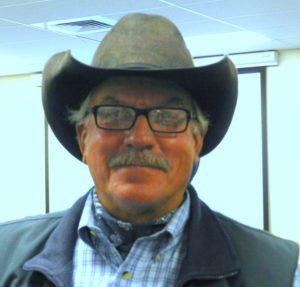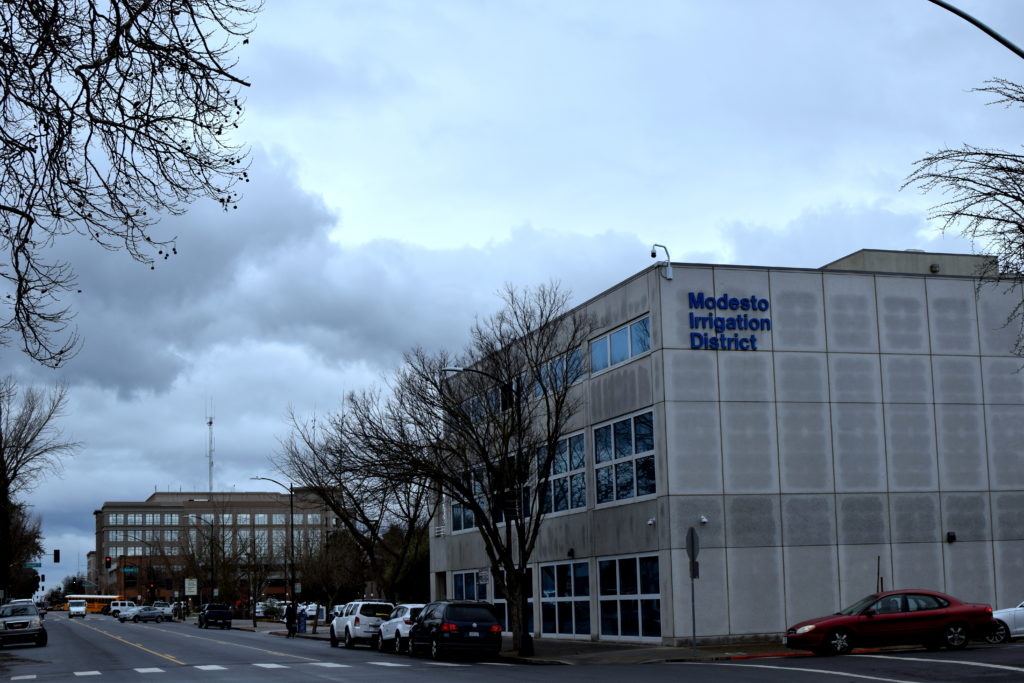
Modesto Irrigation District (MID) Board members Larry Byrd and John Mensinger agree that flash points for their escalating war of words include terminating MID General Counsel Ronda Lewis and an investigation sponsored by Byrd and Nick Blom into supposed illegal activities by fellow board members Mensinger, Stu Gilman, and Paul Campbell. Mensinger, Gilman and Campbell formed a new board majority after Gilman upset incumbent Jake Wenger in 2017.
January 24, the war boiled over into shouted accusations. Both Mensinger and Byrd accused the other of lying, an outburst brought on by Byrd’s removal from the San Joaquin Tributaries Authority (SJTA), where he was replaced by Mensinger.
While Mensinger insisted as late as last Saturday that the change of positions was “routine,” Byrd and many others believe the move was motivated by a willingness among the board majority to sell water, most likely to San Francisco. The SJTA is a coalition of regional water users formed to protect historic water rights through unity and shared resources.
Many close followers of MID’s water policy also believe a desire to sell water was behind the decision to terminate the General Counsel, who was believed to oppose water sales. Mensinger said recently that the board majority felt a change was needed but water sales were not a factor in her dismissal.
A proposed water sale to San Francisco in 2011 resulted in a huge turnover on the MID Board of Directors, when incumbents were voted out. Shortly thereafter, General Manager Allen Short resigned, followed by MID water attorney Tim O’Laughlin. Given the huge public outcry opposing water sales at that time, it’s unlikely today’s board would revive the water sale.
But what many fear is the State of California may offer to mitigate demands for higher flows along local rivers in return for water transfers, most likely to San Francisco. Byrd has said repeatedly he will never agree to water sales outside the Modesto Basin.
Ironically, the lead water attorney for SJTA is Tim O’Laughlin, who not only left MID under the cloud of the proposed water sale but is also the water attorney for Oakdale Irrigation District (OID).
OID’s business plan depends heavily on water sales to buyers in the southern San Joaquin Valley. Thus, O’Laughlin is widely viewed as a promoter of such sales, especially in view of his history at MID. The City of San Francisco, along with MID and OID, is a member of SJTA.
The state’s demands for increased flows along local rivers, including the Tuolumne, San Joaquin and Stanislaus, are widely viewed as a “water grab” that violates historic water rights. But given the financial impacts of increased flows—the flow requirements would result in far less water for farmers—local water districts are hoping to find ways to fend off or mitigate the state’s standards, which could include 40 to 50% higher flows. Local districts have also joined in lawsuits against the state, but the costs promise to be exorbitant.
Until Stu Gilman replaced Jake Wenger on the MID Board, there was general unity among Blom, Byrd and Wenger. Campbell frequently supported them. They were routinely pro-farmer on issues of water and electricity rates.
Gilman’s upset of Wenger was seismic in more ways than one. First, he ran on a promise to achieve economic justice for MID ratepayers, who are widely believed to subsidize farmers through exorbitant rates for electricity. For years, farmers at MID have paid less than the cost of delivery for their water, and several studies have shown the deficits have been made up by charges to urban customers.
Prior to Gilman’s win, MID Board members had agreed to a gradual increase in water rates for farmers, but critics felt the increases were too little and too late. Gilman was able to capitalize on widespread dissatisfaction among urban residents, whose resentment of the farm subsidies has grown over the years.
Ironically, OID farmers pay even less for their water than MID farmers and their routine water sales stir far less public controversy than even hypothetical MID sales. But that’s almost certainly because OID has managed to marginalize complaints about its water policy, even to the extent of suing board members who disagree with the majority.
Even as public sentiment seems to be moving against farm subsidies by urban rate payers, there is still widespread opposition to the state’s “water grab.” Nonetheless, local farmers and urban residents seem to have a blind spot about both water rates and sales.

To people outside the region, water sales, as practiced by OID, suggest we have a surplus of water. Moreover, when farmers insist on getting water at below the cost of delivery while urban rates keep rising, they risk turning widespread public support into widespread public resentment.
Again, to observers outside our region, especially those willing to pay top dollar for water, our water policies seem hypocritical at best. Though we insist increased flows will damage our economy irreparably, we routinely sell water outside the region. And our farmers, even in midst of an unprecedented boom brought on by world-wide demand for almonds, seem to believe they’re entitled to water that isn’t just free, it’s provided at prices below the cost of delivery.
It could well be that MID Board members Mensinger, Campbell and Gilman have become more sensitive to these issues than either Byrd or Blom. This doesn’t necessarily mean the three board members favor water sales. Instead, they may realize that the state has the upper hand in the controversy over flow requirements, not just in terms of ultimate authority but especially in the court of public opinion.
While Byrd and Mensinger may currently be at loggerheads, there’s no question each director is a passionate defender of his district’s interests. Both may learn that no matter how they’re resolved, their conflicts won’t matter in a battle against powers far greater than any coalition of locals. Past history may have put our water districts in far worse bargaining positions than they imagine.


A lesson from Colorado River water use; If we can’t come to agreements at the state level, the Feds may help us! Do we really want that? https://grist.org/article/whats-next-for-the-parched-colorado-the-latest-on-the-wests-drought-drama/?utm_medium=email&utm_source=newsletter&utm_campaign=daily&fbclid=IwAR1JwhoEC2HOGn33VkkvAeevAirxOxjyEb5HAbKFeDtJKmANK-F3f-5Mnqg
I trust Larry Byrd, whom I ran against for the MID boars and lost to in 2011. I also trust Nick Blom as a reliable and community mined director.
John Mensinger has abstained from many board votes regarding payments to district vendors. My public records inquiries stand unanswered. The investigation regarding the abrupt firing of Atty Ronda Lucas, who was my key counsel in stopping the 2011 water sale, was shut down by Mensinger.
Gillman and Campbell ran with support from the Republican Party but now sight Mensinger’s relations the same Democrat leaders seeking to destroy our community through the water grab as reason for him to represent MID on the tributaries association.
There is a great deal to be concerned about at MID. I have long promoted higher AG water rates. Tripling these rates won’t significantly alter residential electric bills. Raising them any higher will increase groundwater use and threaten compliance with drinking water standards- at a very high cost to urban residents.
In short- AG could pay more of its share if even just for symbolism. Modesto residents are better served when water dependent agriculture can count to a solid three on the MID board.
Mr Duarte ; thank you for being involved : we as farmers need farmers involved. So many important decisions to be made : please consider being on the MID board ; you are desperately needed there
My last water bill from Modesto is saying we will have a 9% increase. Is agriculture getting any increases?
MID Directors have agreed to tiered rate increases for farmers. As mentioned above, critics view those increases as too little and too late.
Some more to consider: 1) for 1/2 a century our elected leaders have failed to find the wisdom, foresight and courage to build more dams. 2) Has Stu Gilman, or anyone for that matter, researched how electrical rates have been affected due to state mandated green energy policies. Green energy does cost more like it or not. 3) the urban and agricultural communities need one another. Don’t let them divide us, if they accomplish division the state will use that as an excuse to come and “help” us solve our problems and in the end will get what they covet most- OUR water and OUR futures. 4) We need our elected leaders to protect, serve and unite our community. The recent actions, and the actions currently being considered by Mensinger, Campbell and Gilman are doing just the opposite and thus, putting us all at risk.
IF the MID charged honest rates, no one would be able to criticize. But MID does NOT have an honest rate schedule. When MID makes an average of $93 Million dollars in excess on its rates for electricity, that is not honest.
When MID charges farmers and most high use businesses less for electricity than home owners, that is not honest. In fact, the last KwH costs a whole lot more than the first. There is no benefit to higher demand, especially when peak prices dominate cost of purchase.
Todd, 600 very rich farmers, including Larry Byrd and you, determine rates for 110,000 MID customers, half of which are quite poor, there is no relation to the cost of production and rates. When the average MID employee has a compensation package of over $150,000 annually, you cannot have honest rates.
When I moved to Modesto I became an electric customer of MID. Before living in Modesto I lived in PG&E territory and was a customer of PG&E most of my life. I was shocked at my first MID electric bill when I compared it with PG&E electric it was higher per Kilowatt hour than PG&E. MID is public utility governed by an elected board and pays no property taxes unlike PG&E which is a capitalist Company profit driven for stockholder and it does pay property taxes and franchise taxes to cities it serves.
It is said that with an elected board the customers of MID can control rates except that MID district election prevent such control by the customer or citizen. It is a rigid system
Millionaire Central Valley agriculturalist should not have electric rate subsidize water. They should pay full cost of water because most of the time it is not plentiful in California.
Dave been busy but working on response. Will submit next chance I get.